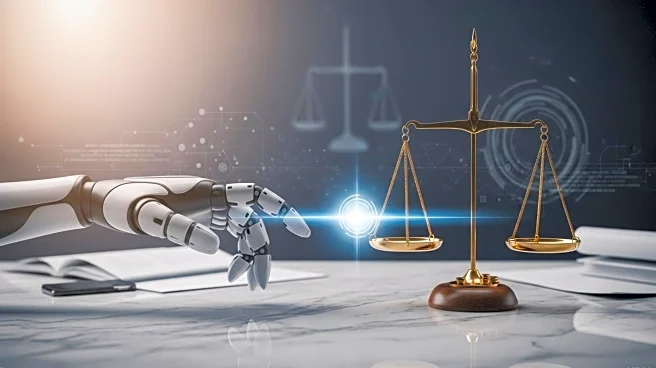What's Happening?
International law firm Pinsent Masons has expressed concerns about the legal industry's failure to effectively communicate the benefits of artificial intelligence (AI) to in-house legal teams. According to partners David Halliwell and Ben Williams, many law firms are adding confusion rather than clarity to the complex technological environment surrounding AI. The firm's article in its magazine Out-Law highlights the disconnect between the AI use cases law firms are familiar with and those that meet the needs of in-house legal teams. While law firms often use AI for large-scale document reviews, in-house teams typically require AI for smaller, more routine tasks. This misalignment has led to in-house lawyers overlooking AI as a valuable tool, despite its potential to streamline processes and enhance efficiency.
Why It's Important?
The critique from Pinsent Masons underscores a significant gap in the legal industry's adaptation to AI technology. In-house legal teams are increasingly seeking ways to leverage AI for efficiency, yet they struggle to find relevant applications due to the industry's focus on large-scale use cases. This disconnect could hinder the adoption of AI in corporate legal departments, potentially affecting their operational efficiency and ability to provide strategic support. As AI continues to evolve, law firms that fail to bridge this gap may lose competitive advantage, while those that successfully align their AI offerings with client needs could enhance their service delivery and client satisfaction.
What's Next?
To address these challenges, law firms may need to develop tailored AI solutions that cater specifically to the needs of in-house legal teams. This could involve providing education on available AI tools and demonstrating their practical applications in routine legal tasks. As in-house teams become more familiar with AI technologies, they may begin to integrate these tools into their workflows, leading to increased efficiency and cost savings. Law firms that proactively support this transition could strengthen their client relationships and position themselves as leaders in legal technology innovation.
Beyond the Headlines
The discussion initiated by Pinsent Masons also raises broader questions about the ethical and practical implications of AI in the legal industry. As AI becomes more prevalent, issues such as data privacy, algorithmic bias, and the potential for job displacement may emerge. Law firms and in-house teams will need to navigate these challenges carefully to ensure that AI is used responsibly and effectively. Additionally, the conversation highlights the importance of continuous learning and adaptation in the legal profession, as technology continues to reshape traditional practices.










